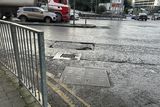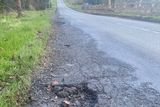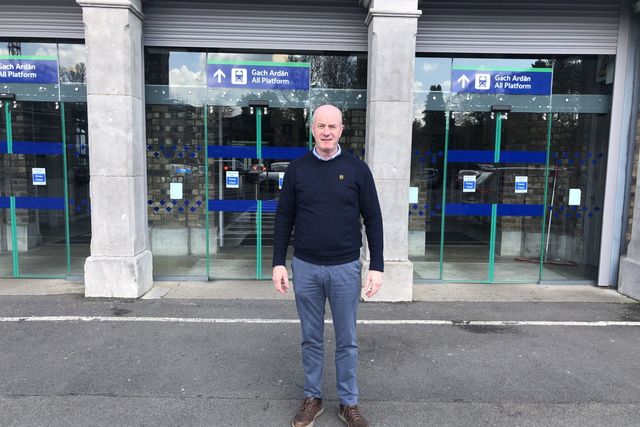Louth’s ‘Pothole Pandemic’ – €130m would be needed to fix county’s ravaged road network
Louth County Council struggling to cope with thousands of road repairs


From Drogheda to Greystones – about 90km – that’s the amount of road repairs Louth County Council has the budget for, yet a senior engineer estimates it would take around €130m to fix all the potholes currently on the county’s roads.
Seasoned councillors have said they have never seen the state of the roads around Drogheda so bad, and the R166 from Drogheda to Termonfeckin alone is singled out as the worst offender, with the recent Irish Water repairs exacerbating an already terrible situation.
Meanwhile, the Drogheda Independent is hearing how motorists, already paying the high cost of road tax and insurance, are forking out for tyre and car repairs as a result of hitting potholes on our roads.
Cyclists too are paying the price, and sometimes in more physical ways, with injuries added to the financial cost.
There was a time when local papers would carry a photograph of a lone councillor pointing at a lone pothole, which would inevitably be filled the following week to great acclaim.
On Drogheda’s roads, which have been likened to ‘swiss cheese’ or ‘the moon’s surface’ in appearance, there aren’t enough councillors, fingers to point, or newspaper pages to capture the sheer volume in 2024.
Cllr Michelle Hall, who lives in Termonfeckin, brought a special motion to the April council meeting in Drogheda calling for a detailed inspection of all roads – both central and rural – and for an emergency action plan to be implemented to tackle the problem.
“I called a special meeting out of sheer frustration as a rural councillor, who reports potholes for months on end before action is taken, and by then, the conditions are even worse,” said Cllr Hall. “And then I heard a Mid Louth councillor say she had no problems getting potholes filled, and that added to my anger!”
Cllr Hall’s motion called on the council to ‘carry out a detailed inspection of the roads to examine potholes, subsidence and lose or submerged manhole covers belonging to Irish Water. This council then devises a plan of action to remedy these effects in a timely manner, which can be communicated to the elected representatives and if necessary, revert to the Department of Transport for additional funding”.
“These are not small potholes; they are huge and causing major damage to cars and bicycles, with people having to put in claims on a daily basis, and I downloaded an app and logged 101 potholes in Termonfeckin alone and that should be done by council staff and maintained,” she said angrily.
“We should have the borough engineer here every two weeks, and outline the work we need done, and make sure it is carried out.”
“The bridge is just cobbled and it's so dangerous for people who cycle; if you're a cyclist and you come across a deep pothole, you either have to swerve into oncoming traffic or you risk going over your handlebars and we're trying to encourage active travel.”
Deputy Mayor of Drogheda Kevin Callan also agreed that the old method of reporting and getting road works carried out locally was more effective.
The Independent councillor says he recalls when the Borough Council was monitored by council staff who were regularly on local roads and overseeing their condition.
“With the abolishing of the Borough Council, we now find roads in worse condition and without the same level of local inspection by council staff which is leading to the public raising these issues more and more with the elected representatives,” said Cllr Callan. “This needs to be addressed and a proactive management programme out in place, rather than the council continuously reacting at a pace that's not keeping up with the deterioration.
“I am the last serving councillor who sat on the Borough Council and I want to see us going back to how things were done before 2014”.
Irish Water has been carrying out extensive works on the Drogheda to Termonfeckin Road since last September, which has caused major traffic disruption and road surface damage.
At the April 2023 Drogheda Borough meeting, councillors heard that it could be another 17 years before all of the repairs needed are reached.
It’s been almost two years since Louth County Council invested in a JCB Pro, in a bid to fix potholes permanently on its 1,000 miles of roads. Tests claim it can carry out permanent pothole repairs in under eight minutes – equivalent to up to 250m2 a day or 700 potholes a month.
“I struggle to see where it would be filling 700 per month, certainly not in South Louth,” commented Cllr Tom Cunningham. “Every pothole I’ve reported has been at least seven or eight months waiting to be filled.”
Cllr Declan Power says he has been told by carers near The Dales in Clogherhead that they have trouble getting to work the roads are so bad, but there is one stretch that comes up time and again.
“I hear so many complaints about the R166, I am seeing them in my sleep,” says the Independent councillor. “We all appreciate the upgrade to the pipework, which will alleviate a lot of problems, but we have to make sure utility services are accountable.”
Councillor Power is actively engaging with residents in areas like Pentony's Lane off the Hill of Rath, where patchwork repairs have proven insufficient. He encourages participation in Local Involvement Schemes (LIS) or Community Involvement Schemes (CIS), funded primarily by the National Transport Authority (NTA) via local authorities and a percentage by local residents. However, he acknowledges the challenges residents face, given their contributions through road taxes, and emphasises the need for increased funding from central government to meet demand.
Even prospective councillors have begun work on this hot topic prior to June’s elections.
"In January, I stepped forward as an independent candidate for local elections and urged the public to notify me of any potholes in their respective areas. I received prompt responses from residents and members of the public of different parts of Drogheda, highlighting areas that required attention. The communication with Louth County Council has been productive, and their quick response time has been commendable, especially considering my non-elected status,” adds Independent candidate Peter James Nugent. “I am aware that many roads need to be resurfaced, and temporary filling of potholes is not a viable solution. In addition, I have been actively addressing the issue of speed ramps on Rathmullen Road, Harmon Gardens, and Dublin Road”.
Senior Engineer Mark Johnson agreed there was a lot of potholes ‘following the wettest March in history’ but they have a road works programme in place.
Read more
“We have 90km to repair and we will put them out to tender in April, and hopefully will have a contractor ready to start all the major road surfaces in June,” he told the meeting.
“We are going around as many as we can but we're getting more than we're able to deal with, so we're not keeping on top of the numbers.
“It's a battle as we've only so many crew and we've got so many roads and it's just there's a lot out there and it's not helped by all the utilities that happens to be digging up over last year and with the R166, you’re waiting for these guys to wrap up before you can get in and repair.”
Meanwhile it’s not just Louth County Council which is being lobbied as East Meath Councillor Elaine McGinty has secured unanimous support for her emergency motion for immediate action by Meath County Council to address the deteriorating state of the Beamore Road and Beamore Crossroads in Drogheda Co Meath.
"In recent weeks, the surface on the Beamore Road has deteriorated rapidly, presenting a serious threat to the safety of those who rely on it daily. The spate of bad weather, and overflow from a blocked historical well in the area, has only worsened an already dire situation. While the council have worked to remedy the situation in the short term, it is clear a longer more detailed plan and investment is needed,” she outlined. “The emergency motion calls on the council to conduct a comprehensive inspection of the road and junction, specifically examining potholes, subsidence, drainage issues, and loose or submerged manhole covers.













